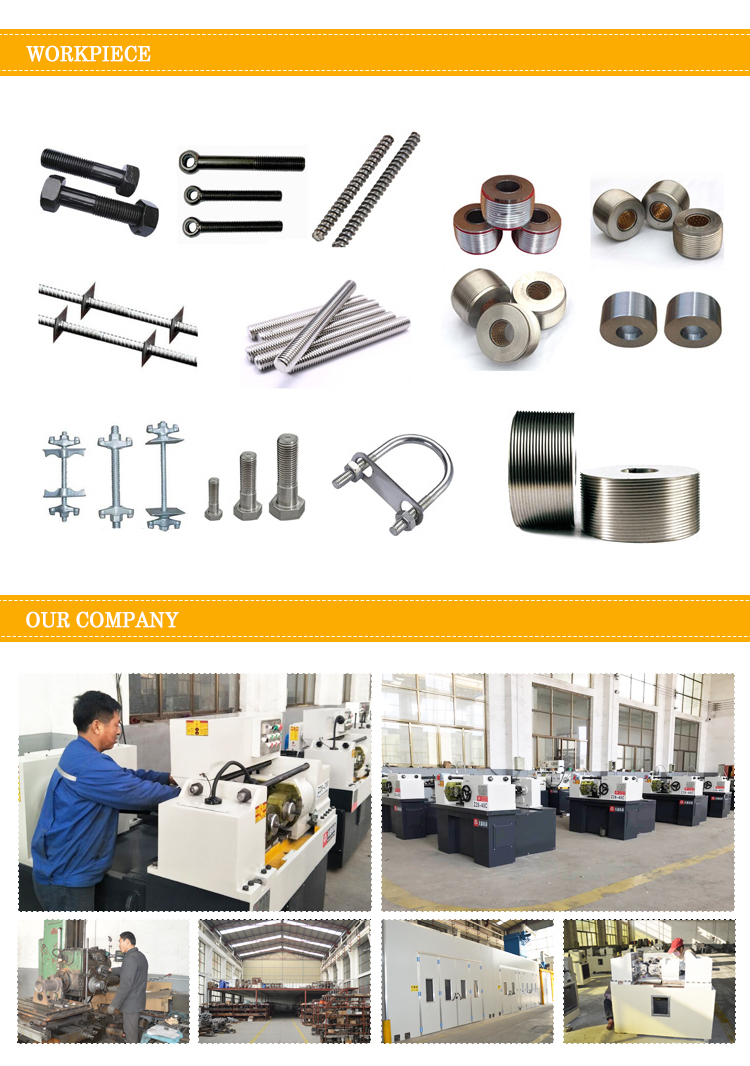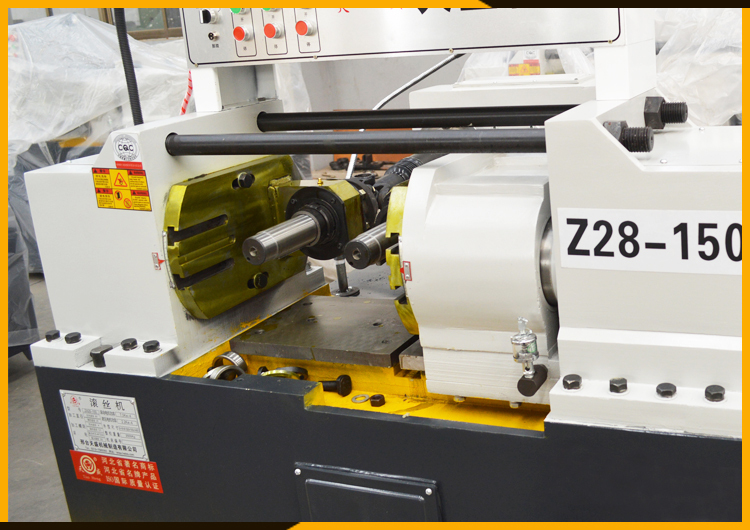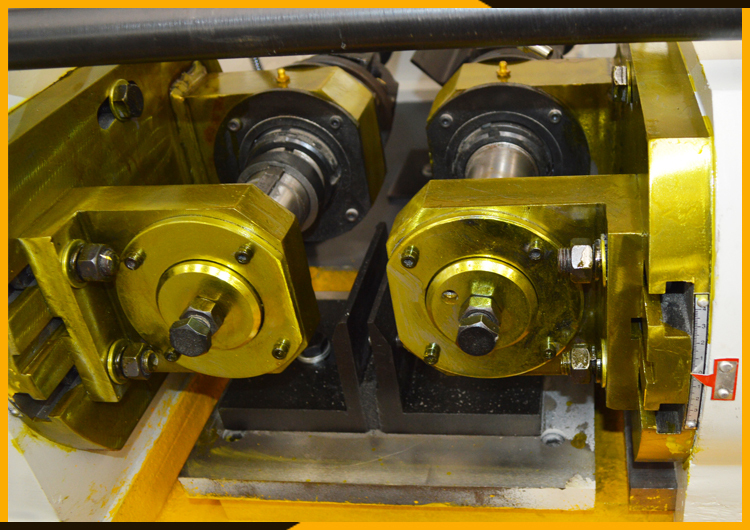huide
thread rolling machine rate
Our products have been exported to Europe, America, Asia, Barbados,Eritrea,Samoa,Northern Mariana Islands,Switzerland,Saint Lucia,Czech Republic. OEM service is also available. And all of our products have been have the patent. So we can make all your idea design that you want.
| Product name | thread rolling machine rate |
| Keyword | hydraulic thread rolling machine price,why is rolled thread more desirable than machined thread,hardev hydraulic thread rolling machine ludhiana punjab,thread rolling machine shop,screw thread rolling machine |
| Place of Origin | China |
| Production Capacity | 293~400/Per Min |
| Power | 2.2~6kw |
| Thread Dia(mm) | 2.0~4.0 |
| Core Components | Motor |
| Thread Length(mm) | 5~50 |
| Condition | New |
| Pre-Sales Service | Inquiry and consulting support. View our Factory. |
| Feature | pipe nipple threading machine in its rolling pressure range of cold, the workpiece for thread, ruled, twill and other treatment; straight, helical and oblique spline gear rolling; straightening, reducing diameter, rolling and various forming rolling. |
| Dimensions | 1982mm*1970mm*1648mm, (Contact us for specific information to confirm) |
| Applicable Industries | Manufacturing Plant, etc. |
| Advantages | thread rolling machine rate--It can be used to process scerw and rebar.The rebar processed by the machine has the good overall mechanical.It can make the tensile strength increased by 20%-30%,the fatigue strength increased by 40%-60%,corrosion resistance increased by 50%-200%.Mechanical properties of rebar connector reached and more than international standards. |
| Weight | 2153kg |
| Product Description | The machine has a safe and reliable electro-hydraulic execution and control system. Each work cycle can be selected in manual, semi-automatic and automatic ways. |
| terms of packing | enerally, we pack our goods in plywood cases. |
| terms of paymen | T/T 30% as deposit, and 70% balance against BL copy |
| Life span | 12 years (Contact us for specific information to confirm) |
| After-sale service | 12 months warrantly, man-made destory will be exception. |
| thread rolling machine rate Advantage | We keep good quality and competitive price to ensure our customers benefit |
| Packing | 2080x2681x1585mm(Contact us for specific information to confirm) |
| OEM/ODM | Customization Service Provided |
| Sales country | All over the world for example:Barbados,Eritrea,Samoa,Northern Mariana Islands,Switzerland,Saint Lucia,Czech Republic |
| MOQ | 2pcs(Contact us for specific information to confirm) |
| Delivery time | 15-20 days for OEM, 5-7days for ready goods. |







thread rolling machine rate
huide-machinery.as one of the most professional thread rolling machine rate manufacturer has the advantages at:
We are the leader thread rolling machine supplier in China, also we have customers worldwide, such as America, Argentina, Brazil, Belarus, Bangladesh, Barbados,Eritrea,Samoa,Northern Mariana Islands,Switzerland,Saint Lucia,Czech Republic, and Italy.We are factory specializing in the manufacture and export of thread rolling machine for more than 20 years, all of the production we sale are at a very best price and high quality.
We take care of our product quality, any defect of the goods, we will take responsibility. You are risk-free.And we believe that the good quality products will can give us survival, so, we always offer the top quality products to our customers, to keep them have the competitiveness in there market.
thread rolling machine rate services FAQs Guide
Are you looking for a quick review guide about thread rolling machine rateservices?
An ultimate FAQ buying guide is available to help you.This guide contains all the information about all the important facts, figures, and various processes regarding thread rolling machine rate services.
Let’s continue!
2.Is a thread rolling machine rate Suitable for High Volume Production?
3.How Does the Cost of a thread rolling machine rate Compare to Other Thread Forming Methods?
4.Are There Different Types of Thread Rolling Dies?
5.What are Some Common Applications of Threads Created by a thread rolling machine rate?
6. If the machine get damaged, what can I do ?
7.How does the thread rolling process compare to other methods such as chasing or grinding?
8.Can a thread rolling machine rate create threads on hardened materials?
9.Can a thread rolling machine rate handle different thread types such as ACO, UNF, or NPT?
10.Can a thread rolling machine rate be Automated?
11.What are the Safety Precautions when Operating a thread rolling machine rate?
1.What Quality Control Measures are Used in thread rolling machine rate Production?
1. Material Inspection: The first step in quality control is to inspect the raw materials used in the production of thread rolling machines. This includes checking the quality and specifications of the steel, bearings, gears, and other components.
2. Machine Calibration: Before starting the production process, the thread rolling machine is calibrated to ensure that it is functioning properly and producing accurate threads.
3. In-process Inspection: During the production process, regular inspections are carried out to check the dimensions, surface finish, and other critical parameters of the thread rolling machine.
4. Statistical Process Control (SPC): SPC is a method used to monitor and control the production process by collecting and analyzing data. This helps to identify any variations or defects in the production process and take corrective actions.
5. Final Inspection: Once the thread rolling machine is completed, a final inspection is carried out to ensure that it meets all the required specifications and standards.
6. Performance Testing: The thread rolling machine is tested for its performance by running it with different types of materials and thread sizes to ensure that it can produce accurate and consistent threads.
7. Quality Management System: Most manufacturers have a quality management system in place to ensure that all the processes and procedures are followed correctly and any issues are addressed promptly.
2.Is a thread rolling machine rate Suitable for High Volume Production?
We have a professional team that is committed to the innovation and development of thread rolling machine rate.
Yes, a thread rolling machine is suitable for high volume production. Thread rolling machines are designed to efficiently and accurately produce threads on a large scale. They are capable of producing threads at a much faster rate than traditional methods such as cutting or grinding. Additionally, thread rolling machines have a longer tool life and require less maintenance, making them ideal for high volume production.
3.How Does the Cost of a thread rolling machine rate Compare to Other Thread Forming Methods?
We continue to improve thread rolling machine rate products and processes to improve efficiency.
The cost of a thread rolling machine can vary depending on the size, type, and features of the machine. However, in general, thread rolling machines tend to be more expensive than other thread forming methods such as tapping or die cutting.
One of the main reasons for this is that thread rolling machines are more complex and require more precision in their design and construction. They also have a higher production capacity and can produce threads at a faster rate compared to other methods.
Additionally, thread rolling machines require specialized tooling and dies, which can add to the overall cost. However, once the initial investment is made, thread rolling machines can be more cost-effective in the long run due to their efficiency and durability.
In comparison, tapping and die cutting methods may have lower upfront costs, but they may require more frequent tooling replacements and have slower production rates, leading to higher long-term costs.
Overall, the cost of a thread rolling machine may be higher initially, but it can provide significant cost savings and efficiency in the long run.
4.Are There Different Types of Thread Rolling Dies?
We pay attention to the transformation of intellectual property protection and innovation achievements. Your OEM or ODM order design we have a complete confidentiality system.
Yes, there are different types of thread rolling dies, including:
1. Flat dies: These are the most common type of thread rolling dies and are used for producing external threads on cylindrical parts.
2. Circular dies: These dies have a curved profile and are used for producing threads on conical or tapered parts.
3. Planetary dies: These dies have multiple thread profiles on a single die and are used for producing threads on complex or non-cylindrical parts.
4. Rack dies: These dies have a straight, toothed profile and are used for producing threads on long, thin parts such as screws or bolts.
5. Knurling dies: These dies have a serrated profile and are used for producing knurled patterns on cylindrical parts.
6. Thread forming dies: These dies do not cut material but instead deform it to create threads. They are used for producing threads on soft or brittle materials.
7. Combination dies: These dies have multiple thread profiles on a single die and can be used for both rolling and cutting threads.
8. Adjustable dies: These dies have adjustable thread profiles and are used for producing threads of different sizes on the same die.
9. Tapered dies: These dies have a tapered profile and are used for producing tapered threads on parts such as pipes or fittings.
10. Thread chasers: These dies are used for repairing damaged threads on existing parts. They have a cutting profile that matches the damaged thread and can be used to restore it to its original size and shape.
5.What are Some Common Applications of Threads Created by a thread rolling machine rate?
As one of the top thread rolling machine rate manufacturers in China, we take this very seriously.
1. Fasteners: Thread rolling machines are commonly used to create threads on bolts, screws, and other fasteners. This allows for a stronger and more precise thread compared to traditional cutting methods.
2. Automotive Industry: Thread rolling machines are used to create threads on various automotive components such as engine parts, suspension components, and transmission parts.
3. Aerospace Industry: Threads created by thread rolling machines are used in the production of aircraft components such as landing gear, engine parts, and structural components.
4. Construction Industry: Threaded rods and bolts used in construction are often created using thread rolling machines. This ensures a strong and reliable connection between building materials.
5. Medical Industry: Threaded components are used in medical devices such as implants, surgical instruments, and prosthetics. Thread rolling machines are used to create precise and durable threads for these applications.

6. If the machine get damaged, what can I do ?
In the guarantee time (15 months) , we will send the spare parts to you for free and provide the technical consultant for anytime. If more terrible, we can send our engineers to your factory. We will provide same good after-sale service as the pre-sale service. For any of your questions, we will reply within 12 hours.
7.How does the thread rolling process compare to other methods such as chasing or grinding?
We should have a stable supply chain and logistics capabilities, and provide customers with high -quality, low -priced thread rolling machine rate products.
Thread rolling is a cold forming process that uses hardened steel dies to deform the surface of a cylindrical blank, creating the desired thread profile. This process is typically used for high volume production of precision threads and offers several advantages over other methods such as chasing or grinding.
1. Faster Production Speed: Thread rolling is a high-speed process that can produce threads at a rate of up to 1000 parts per minute. This is significantly faster than chasing or grinding, which are typically slower processes.
2. Improved Thread Strength: The cold forming process of thread rolling results in a work-hardened surface that is stronger and more durable than threads produced by chasing or grinding. This makes thread rolling ideal for applications that require high strength and reliability.
3. Better Surface Finish: Thread rolling produces a smooth and precise thread surface, which is important for applications that require a tight fit or smooth movement. Chasing and grinding can result in rougher surfaces that may require additional finishing processes.
4. Cost-Effective: Thread rolling is a cost-effective process, especially for high volume production. The use of hardened steel dies also makes it a more durable and long-lasting method compared to chasing or grinding, which may require frequent replacement of tools.
5. Versatility: Thread rolling can be used to produce a wide range of thread sizes and profiles, making it a versatile process for various applications. It can also be used on a variety of materials, including steel, aluminum, and plastic.
In comparison, chasing and grinding are more suitable for smaller production runs or for repairing damaged threads. They also require more skilled labor and may result in higher costs for tooling and setup. However, they may be more suitable for producing specialized or non-standard thread profiles.
Overall, thread rolling offers a faster, more cost-effective, and versatile method for producing high-quality threads, making it a preferred choice for many industrial applications.
8.Can a thread rolling machine rate create threads on hardened materials?
Our company has many years of thread rolling machine rate experience and expertise.
Yes, a thread rolling machine can create threads on hardened materials.
The process of thread rolling involves pressing a hardened steel die onto the surface of the material, which displaces the material and forms the threads. This process is suitable for creating threads on a wide range of materials, including hardened materials such as stainless steel, titanium, and hardened steel. However, the hardness of the material may affect the speed and efficiency of the thread rolling process. It is important to use the appropriate die and machine settings for the specific material being threaded to ensure the best results.
9.Can a thread rolling machine rate handle different thread types such as ACO, UNF, or NPT?
Our mission is to provide customers with the best solutions for thread rolling machine rate.
Yes, a thread rolling machine can handle different thread types such as ACO, UNF, or NPT. These machines are designed to be versatile and can be adjusted to produce different thread types by changing the dies or adjusting the machine settings. However, it is important to note that some thread rolling machines may be specifically designed for certain thread types, so it is important to check the machine's capabilities before use.
10.Can a thread rolling machine rate be Automated?
We focus on teamwork and communication to achieve common goals, We attach great importance to this detail.
Yes, a thread rolling machine can be automated. Automation can be achieved through the use of computer numerical control (CNC) technology, which allows for precise and repeatable control of the machine's movements and operations. This can greatly increase the efficiency and productivity of the thread rolling process, as well as reduce the potential for human error. Additionally, some thread rolling machines may also have built-in automation features such as automatic thread length measurement and adjustment, automatic lubrication systems, and automatic tool change capabilities.

11.What are the Safety Precautions when Operating a thread rolling machine rate?
We adhere to the principle of quality first and have a complete production quality management system and quality inspection process.
1. Wear appropriate personal protective equipment (PPE) such as safety glasses, gloves, and earplugs to protect against flying debris and noise.
2. Make sure the machine is properly grounded to prevent electrical hazards.
3. Before starting the machine, ensure that all guards and safety devices are in place and functioning properly.
4. Keep the work area clean and free of clutter to prevent tripping hazards.
5. Do not wear loose clothing or jewelry that could get caught in the machine.
6. Familiarize yourself with the machine's operating manual and follow all safety instructions.
7. Never operate the machine if you are fatigued or under the influence of drugs or alcohol.
8. Do not attempt to adjust or repair the machine while it is in operation.
9. Use the correct size and type of thread rolling dies for the material being worked on.
10. Always use a push stick or other tool to feed the material into the machine to keep your hands and fingers away from the moving parts.
11. Do not touch the rotating parts of the machine while it is in operation.
12. If the machine jams or malfunctions, turn off the power and wait for all moving parts to come to a complete stop before attempting to fix the issue.
13. Regularly inspect the machine for any signs of wear or damage and perform maintenance as recommended by the manufacturer.
14. Only trained and authorized personnel should operate the thread rolling machine.
15. In case of an emergency, know the location of the emergency stop button and how to use it.
- Place of Origin:
- Video outgoing-inspection:
- Machinery Test Report:
- Marketing Type:
- Warranty of core components:
- Core Components:
- Key Selling Points:
- Applicable Industries:
- Application:
- Condition:
- Production Capacity:
- Voltage:





















